Incisional Hernia Repairin New Jersey


Incision sites of previous abdominal surgeries can generate hernias. In fact, it’s not uncommon. As many as 15 percent of patients who have undergone any type of abdominal surgery develop a hernia along or near their incision scars.
At the very least, these Incisional Hernias are bothersome and frustrating, and they may be painful or even pose serious medical risks. In most cases, they should be surgically repaired.
Schedule a consultation with Dr. Shomaf Nakhjo at Advanced Minimally Invasive Surgery for your New Jersey Incisional Hernia Repair. Dr. Nakhjo is a nationally acclaimed and board-certified authority on hernia repair procedures that use the least invasive surgical technique available and appropriate for each patient. He warmly invites you to start a conversation about fixing your incisional hernia for good by registering here at advancedsurgerynj.com or calling (973) 383-2222.
Traditional laparoscopic/robotic techniques dictate 3-4 separate incisions and require the surgeon to poke additional holes through the abdominal wall to secure mesh. Dr. Nakhjo does not do any of this.
The overwhelming majority of our laparoscopic ventral hernia repairs only require 2 small incisions, the mere width of a finger nail. That’s it. Nothing Else.
It necessitates fewer incisions than a laparoscopic appendectomy or laparoscopic gallbladder procedure.
We do not offer robotic hernia surgery, and the rationale behind this decision is the absence of any clear advantage over laparoscopic hernia repair. Numerous reputable studies indicate that, on average, robotic hernia repairs take twice as long to complete and frequently entail more incisions compared to laparoscopic hernia repair. Furthermore, robotic surgery comes at a significantly higher cost for achieving the same end result. Robotic hernia repair proves inefficient in terms of both cost and surgical duration for the majority of hernia procedures.
Patient with large incisional hernia after major abdominal surgery 2 years prior. Patient was initially seen at a major academic center who stated to them that he would need an open repair with a "team" of surgeons and be admitted to the hospital for several days with drain placement. He was told that he could not return to work for at least 4 to 6 weeks.
Patient came to us for a second opinion and wanted a minimally invasive approach.
Abdominal wall reconstruction was performed laparoscopically with 2 small incisions. Surgery took approximately 1.5 hours and went home the same day. Patient was back at work after one week. After a one year follow up patient doing well, fully functional with no complaints.
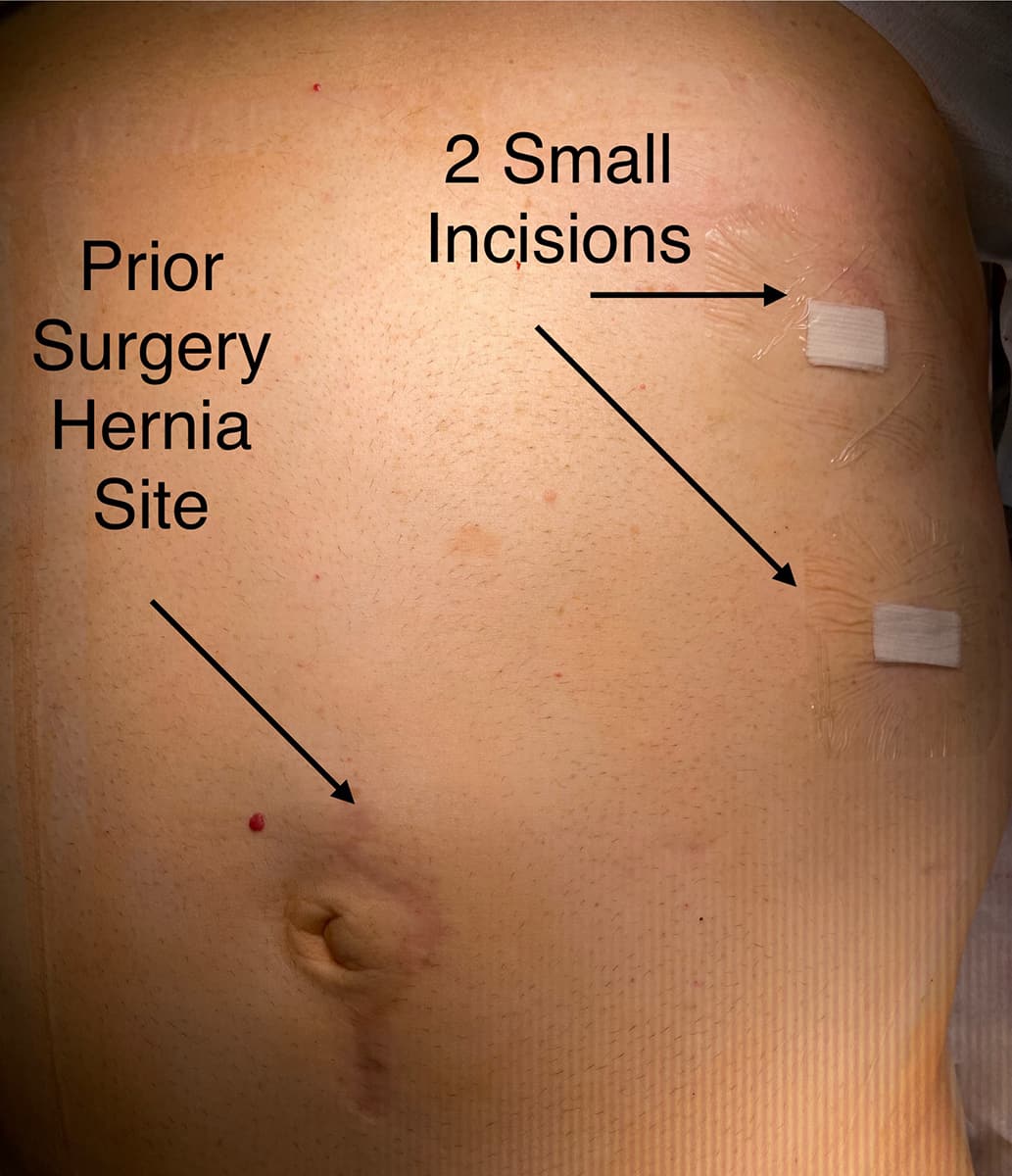
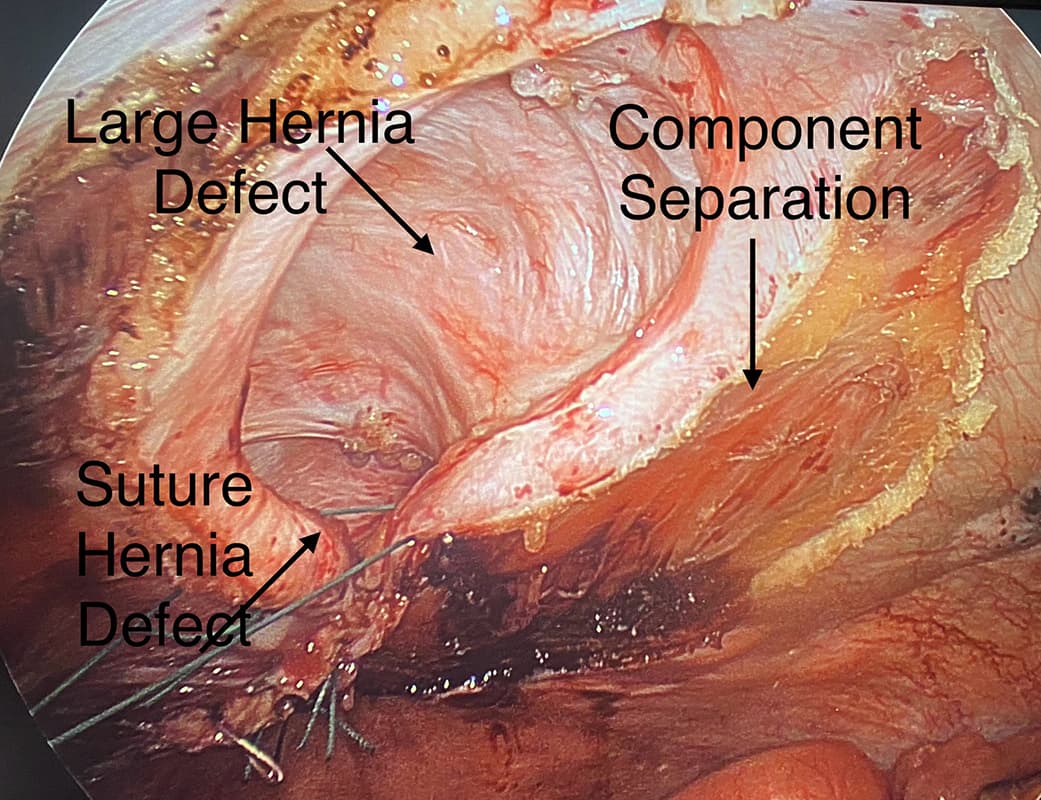
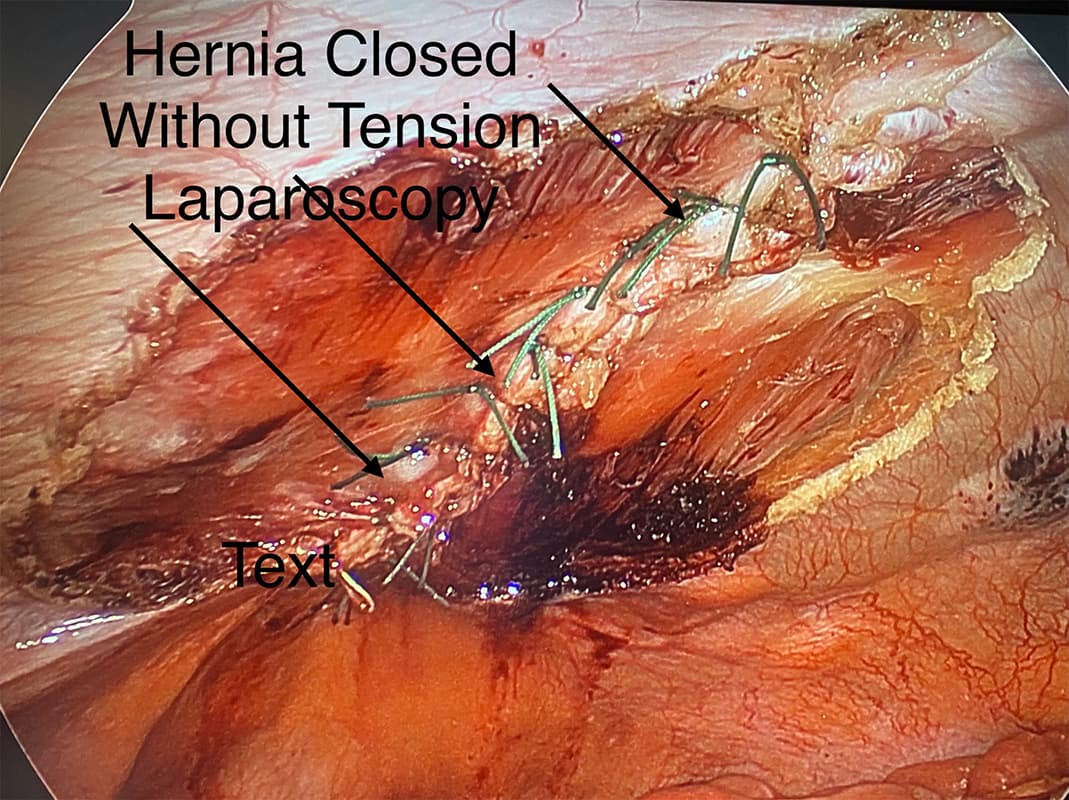
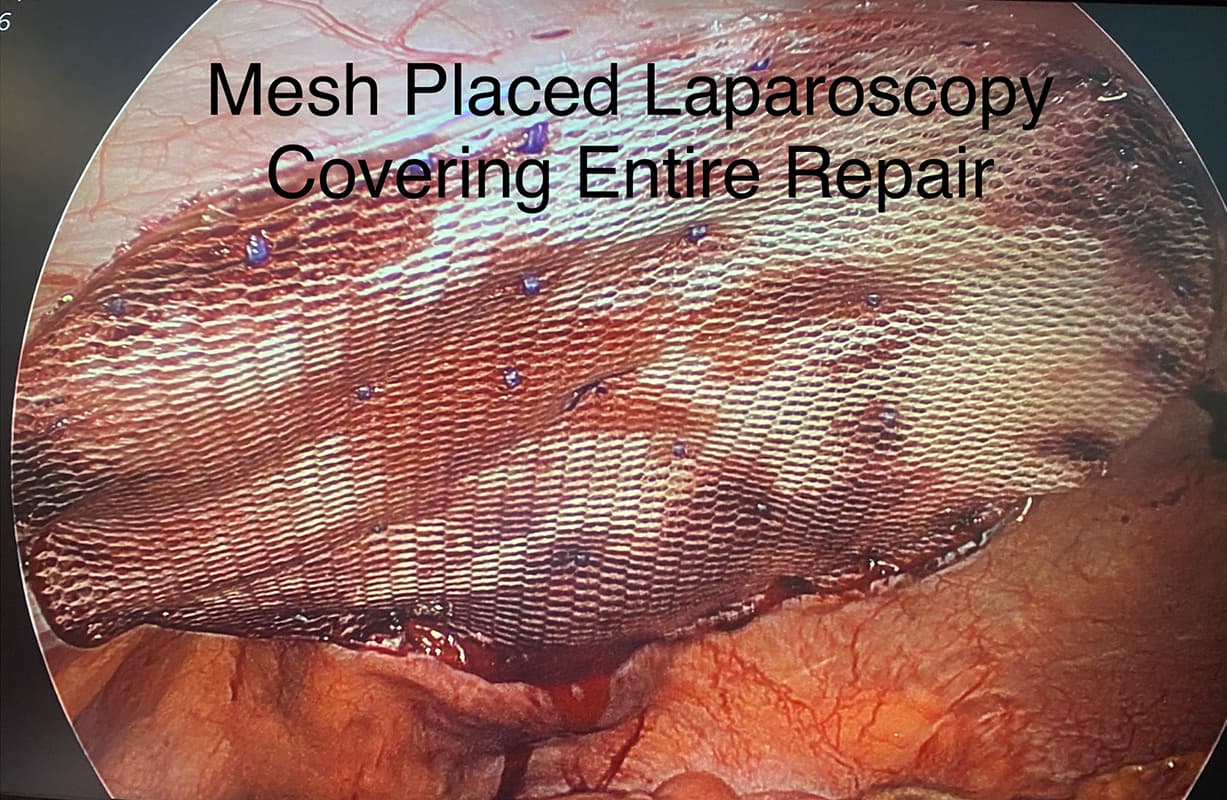
We do not place multiple sutures through the abdominal wall to secure the mesh. This creates unnecessary trauma which increases post operative pain and higher infection rates.
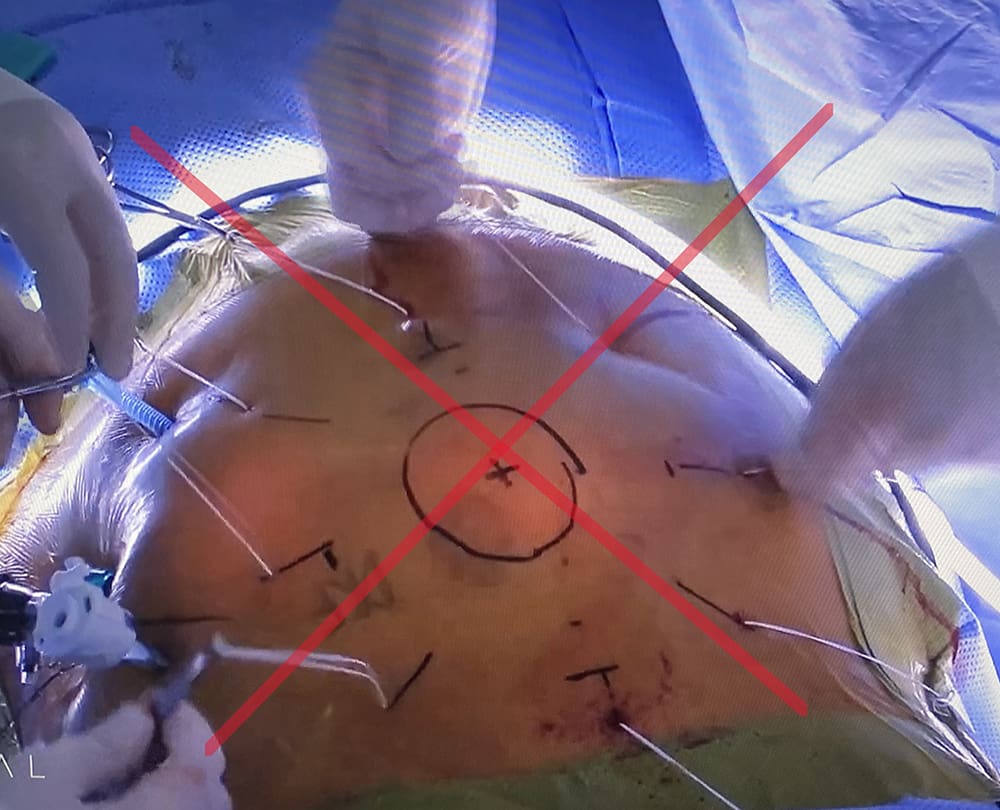
We do not place mesh over the hernia defect without closing the defect with sutures first. Failure to close the hernia defect leeds to mesh buckling through the hernia site and an unacceptably high recurrence rate. We close every hernia defect with suture then place mesh on top of the hernia defect for a "double repair" which leads to the best possible results
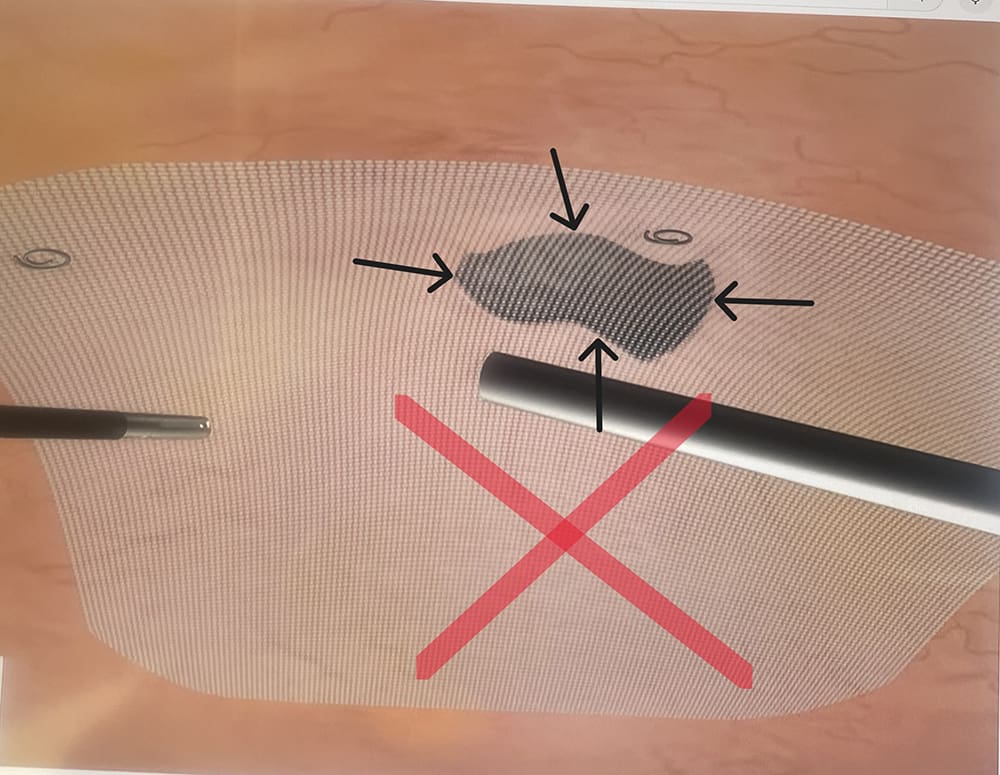
An Incisional Hernia can disrupt your life and overall sense of well-being. Learn about what causes incisional hernias and how minimally invasive surgery can deliver long-lasting relief.
A hernia refers to the structural defect that is caused when an organ or fatty tissue protrudes through a weak spot in the abdominal wall.
An Incisional Hernia is a hernia that develops at or near the site of—and as a result of—a previous surgery. If the cut that was made in the original surgery does not grow back together tightly and securely enough, the abdominal wall may become weakened. If the incisional area can no longer withstand pressure, parts of organs or tissues may push through the breach, causing a bulge. Incisional Hernias may develop months or years after an abdominal surgery.
In addition to being uncomfortable, irritating, unsightly, and inconvenient, incisional hernias can limit your activity and even impair your breathing. In some cases, parts of your bowel can get trapped in the opening, cutting off blood supply and/or obstructing the passage of stool.
Incisional hernias can occur for a number of reasons, including:
While Incisional Hernias can happen at any time, they are statistically most likely to occur within 3-6 months following surgery. However, if the hernia appears within the first few weeks following abdominal surgery, the hernia should not be repaired immediately in order to give the abdominal wall time to recover.
While medical imaging may be used, incisional hernias can often be visually diagnosed by a lump or protrusion at or near the site of a previous incision. Your doctor may ask you to stand and cough, which tends to make a hernia more prominent.
Incisional hernias will not heal on their own. Surgical intervention is needed to repair a hernia. Two surgical techniques are available:
The choice between open and keyhole surgery may be based on a patient’s general health, individual anatomy, size and location of the hernia and desired level of future physical activity.
If both “open” and “keyhole” techniques are equally viable in a particular case, laparoscopy has many advantages. Incisions are much smaller, and thus much less likely to become infected. Hospital stays and recovery times tend to be shorter.
If you have a hernia resulting from a previous surgery, you are likely a candidate for minimally invasive laparoscopic Incisional Hernia Repair in New Jersey. Confirm your candidacy and begin your treatment process by scheduling your consultation with Dr. Nakhjo.

Dr. Nakhjo will carefully review your medical history, including all previous abdominal surgeries. He will examine your incision sites and perform other tests as needed to confirm a diagnosis of Incisional Hernia before recommending the surgical technique and strategy best suited to your repair.
For a specified period before and after your surgery, Dr. Nakhjo will direct you to suspend use of any supplement or medication that may elevate surgical bleeding levels. If you smoke, you’ll need to stop, and restrict your alcohol intake in the weeks prior to your surgery.
You can drink a total of 12 ounces of water between midnight and two hours before your scheduled arrival time, but must not drink anything after that.
When you wake up in a recovery room, your medical staff will keep track of your temperature, pulse, blood pressure, and oxygen levels. You may be getting oxygen through a thin tube that rests under your nose or from a mask that covers your nose and mouth. Most of our New Jersey Incisional Hernia Repair patients can return to desk jobs in a matter of a few days to a week.
You will be given detailed and specific recovery instructions. It is vitally important that you follow them diligently to ensure a full, safe and durable incisional hernia repair.
Hey, you don’t want to do this again. (Neither do we.) Avoid straining your abdominal muscles for a few months after your surgery. Don’t lift anything heavier than ten pounds for at least six weeks. During that same period, stay away from all high-energy activities such as jogging or tennis and don’t even think about contact sports. The best way to regain your stamina is to do a moderate amount of regular aerobic exercise like walking and stair climbing.
Incisional hernia repairs delivers ultimate relief. For the best possible outcome, discuss your minimally invasive treatment with Dr. Shomaf Nakhjo.
Dr. Nakhjo is board-certified and fellowship trained in advanced, minimally invasive surgical procedures. His specialized training enables him to offer alternatives to open surgery, which can improve your recovery and reduce surgical scarring. Dr. Nakhjo has performed more than 4,000 surgical procedures and is a leading provider of advanced laparoscopic surgical care in Northern New Jersey. Book that consultation by registering on this website or calling (973) 383-2222.

Since your surgery will be performed using general anesthesia, you will feel nothing during the procedure. You will have some post-surgical discomfort and soreness. Dr. Nakhjo will prescribe pain management medication as needed and appropriate.
All surgeries do, in this case including bleeding, infection, intestinal injury, and blood clots. Risks are elevated for patients who are very overweight or have chronic medical conditions.
While that decision may vary from case to case, Dr. Nakhjo has developed a procedure and technique that provide a secure and durable closure without the need for mesh reinforcement.
No. Some people are able to function normally and comfortably with a mild Incisional Hernia. But the hernia cannot be repaired without surgery.
Our "Ask the Dr. Anything" service is tailored to address any questions or uncertainties you may have regarding your hernia troubles. Whether you're seeking clarification on symptoms, treatment options, or our practice, we are here to provide you with comprehensive information and guidance.
Please feel free to email us at: advancedsurgerynj.com. Under Subject type “ADA'' and Dr. Nakhjo will be happy to answer your questions.
Let's navigate the complexities of your hernia troubles together, ensuring you have the support you need for a healthier tomorrow.
For the most advanced treatment, easiest recovery, and best possible results with minimally invasive surgery in New Jersey, begin your journey with Dr. Shomaf Nakhjo today. Schedule your consultation at either of our convenient locations to begin discussing your personalized treatment plan with a highly skilled and renowned area specialist.